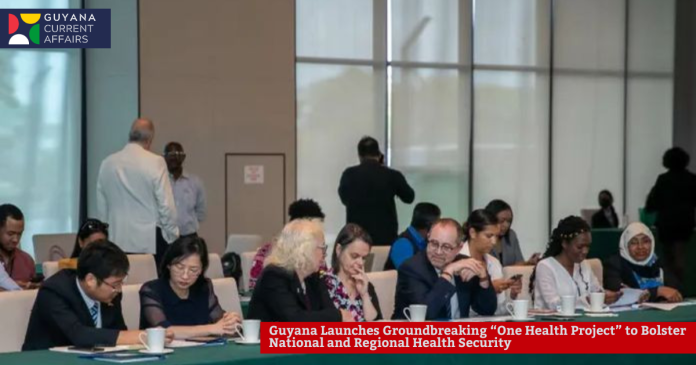In a historic move for public health in the Caribbean, Guyana officially launched the “Guyana One Health Project” at a ceremony held at the Aiden Hotel in Georgetown. The US$22 million initiative, funded by a grant from the Pandemic Fund and the World Bank, positions Guyana as the first country in Latin America and the Caribbean—and only the second globally—to implement a comprehensive One Health Project.
The project is designed to transform Guyana’s capacity to prevent, prepare for, and respond to health emergencies by integrating human, animal, and environmental health systems. This approach, known as “One Health,” is widely recognized as the gold standard for managing complex health threats that emerge at the intersection of people, animals, and the environment.
Speaking at the launch, Minister of Health Dr. Frank Anthony emphasized the critical lessons learned from the COVID-19 pandemic, which exposed vulnerabilities in surveillance, laboratory capacity, and border security. “We must be able to see what is happening in any part of the country and once we see a hotspot, we will have rapid response teams that will respond in a timely manner so that it doesn’t become a problem,” Dr. Anthony stated.
The One Health Project will focus on five major components over the next three years:
- Enhancing laboratory and workforce capacity, including the establishment of a state-of-the-art laboratory that will serve as a regional reference hub for the Caribbean
- Strengthening health surveillance systems for early detection and rapid response to outbreaks
- Building robust One Health coordination and operational capacity
- Implementing project management, monitoring, and evaluation frameworks
- Creating a contingency emergency response mechanism for swift action during crises
Technical Project Lead Dr. Anand Persaud highlighted the importance of modernizing Guyana’s health infrastructure, including digitizing surveillance systems and decentralizing laboratory networks. The project will also expand veterinary and wildlife diagnostic capacity, crucial for detecting zoonotic diseases—those that can jump from animals to humans.
A key feature of the initiative is its emphasis on workforce development. The project will train a new generation of health professionals, from laboratory scientists to port health officers, equipping them with the skills to detect, report, and respond to outbreaks. Training will also cover supporting individuals affected by gender-based violence, which often increases during health crises.
The One Health Project is not limited to government systems. It will launch awareness campaigns in farming communities, schools, households, and the private sector, promoting responsible antibiotic use, good hygiene practices, and safe interactions with wildlife and livestock.
World Bank representatives praised Guyana’s swift and effective proposal process, noting that the country completed its application in just four months—far faster than the typical year-long timeline. The project is seen as a direct response to the destabilizing impact of the COVID-19 pandemic, aiming to ensure that Guyana and its neighbors are better equipped for future health threats.
Priya Basu, Executive Head of the Pandemic Fund, called the project a significant milestone, reminding attendees that investments in preparedness cost only a fraction of the devastation wrought by unpreparedness.
As Guyana takes this bold step, the nation sets a new standard for health security in the region, offering a blueprint for other countries to follow in the quest for a safer, healthier future.


